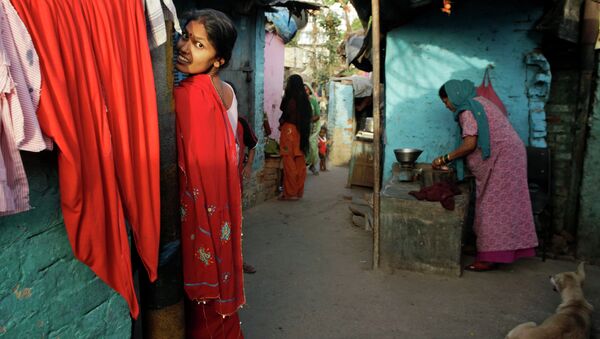New Delhi (Sputnik) — The ‘extremely rich Vs extremely poor' paradox is what attracts tourists to Mumbai who not only stay at the country's most luxurious hotels but also visit its slums out of curiosity, excitement, thrills and sometimes even for moral and altruistic reasons. But visitors mostly witness only the sight and stench of poverty emanating from the slums. Seldom do they get to know how close-knit the social fabric of the slums can be and how even in poverty people can be content.
The idea of providing tourists the opportunity of experiencing the slum life with slum dwellers first germinated in the mind of David Bijl, originally from the Netherlands, now working with an NGO in Mumbai. When two of his acquaintances, Varsha and Ravi Sansi, were discussing ways to increase their household income, David advised them that they could perhaps host travelers and the duo readily agreed. David, Varsha, and Ravi are now the proud co-founders of Mumbai Slumstay.
READ MORE: Over Two Million Delhi Slum Dwellers Allowed to Stay Until December 2017
Sputnik spoke to David Bijl who says that though the initiative is still in the nascent stage, they have already attracted tons of accolades as well as criticism.
Sputnik: Tell us more about the Slum Homestay initiative. What are your objectives of the venture?
David Bijl: The Slum Homestay offers accommodation to travelers who want to learn about the countries and cities they visit. At the homestay, they will be hosted by Ravi Sansi and his family who are living in a slum in Mumbai. This gives them a unique insight into the environment where 60% of Mumbai's population lives. The first objective is to provide a source of income for the hosts. Secondly, this initiative can bring people together who would normally never interact. This can create an understanding that you don't get from seeing the slums on TV, but will also give the slum dwellers a form of recognition. They often feel like outsiders, and so bringing people to their slum is a way of saying that they play an equal part in Indian society.
Sputnik: What kind of response have you garnered so far?
David Bijl: We have just started and are getting some media attention. The responses are mixed but largely positive. Some people are critical because they don't want this side of India to be on display. Some people think it's exploitation of the slum family, though all of the income goes to them and they themselves run the property. Most people, both Indians & westerners support the initiative and say that either they'd like to come themselves or they think all Indian politicians should stay there for a few days to understand their people.
— V.R.Ajith kumar (@ajithkumarvr) January 29, 2018
This is so white https://t.co/Pj6DhL7q2B
— KING (@KINGPR1NCESS) January 29, 2018
Sputnik: What are your future plans? Do you look forward to expansion?
David Bijl: Future plans are to first wait out the responses from our first guests and, most importantly, other people in the slum community. We want a positive effect and if that does not happen, it wouldn't be a good idea to continue or even expand. I have already received interest from potential international partners to do this in Peru and Sri Lanka as well, or other cities in India. And I know someone in Mumbai is already trying to copy this. But expansion before carefully monitoring the effects would not be a good idea.
Sputnik: There are criticisms from some quarters that this is indeed poverty tourism, what do you have to say on this?
David Bijl: I understand the comparison to poverty tourism. It's a new idea and people generally try to categorize new ideas with things they already know. There are a few important differences though. All of the income goes directly to the hosts themselves. Not to any company; not to an NGO, but to the people living in the slum and doing all the work. The second difference, maybe even more important, is that Ravi and his family is in charge. They decide who comes in and when; they decide how to run the homestay.
— Pooja (@poojapabari) January 29, 2018
— LlL MISS SHDEVIL (@LilMissDiabla) January 30, 2018
Sputnik: What is your message to the international tourists?
David Bijl: The message to Sputnik readers would be to think about what you want to get out of your trip when you're coming to India. Not all travelers are good customers for a place like this. If you want to see the touristic highlights and just relax, staying in a slum might not be for you. There are a lot of travelers though who travel to experience and to learn new things. If you want to really know Mumbai, the slums are part of that. And you won't learn much about them from your 5-star hotel in Bandra or a backpackers hostel in Colaba. Staying in the slum homestay would be one of the unique experiences of your life. And if you keep your heart and mind open it might be one of the most beautiful as well. This is not to idealize their situation; living in a slum is definitely hard and dire at times. But there is love, joy, and beauty there as well.
The views and opinions expressed by David Bijl in this article are those of the speaker and do not necessarily reflect the position of Sputnik.

